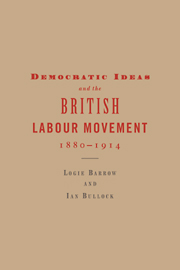Book contents
- Frontmatter
- Contents
- Acknowledgements
- Introduction
- Part 1
- Part 2
- Part 3
- 7 The early 1900s: a hinge period
- 8 Socialists and the state
- 9 Parliamentary socialism? Labour in parliament
- 10 Parliamentary democracy? ‘Fred's obsession’ and the path to the Bradford resolution
- 11 Background to syndicalism: the legacy of the NIGFLTU's failure
- 12 Avoiding the ‘Servile State’. The impact of Syndicalism and Guild Socialism
- 13 1914: an emerging consensus on the eve of Armageddon
- Conclusions
- Appendix: Federation for local Labour historians – and for national
- Index
13 - 1914: an emerging consensus on the eve of Armageddon
Published online by Cambridge University Press: 09 November 2009
- Frontmatter
- Contents
- Acknowledgements
- Introduction
- Part 1
- Part 2
- Part 3
- 7 The early 1900s: a hinge period
- 8 Socialists and the state
- 9 Parliamentary socialism? Labour in parliament
- 10 Parliamentary democracy? ‘Fred's obsession’ and the path to the Bradford resolution
- 11 Background to syndicalism: the legacy of the NIGFLTU's failure
- 12 Avoiding the ‘Servile State’. The impact of Syndicalism and Guild Socialism
- 13 1914: an emerging consensus on the eve of Armageddon
- Conclusions
- Appendix: Federation for local Labour historians – and for national
- Index
Summary
During what turned out to be the final year or so before the outbreak of war there were signs of a new consensus within the socialist movement. Crucial to this was a greater awareness than perhaps before or since that aim, strategy and organisation interact.
One factor tending to unify discussions was directly political: the BSP was preparing to seek affiliation to the Labour Party, removing a barrier to ‘socialist unity’ which had existed since the SDF's withdrawal from the LRC in 1901. When Harry Quelch fell ill, the editing of Justice was taken over by a ‘Commission’ consisting of H. W. Lee, Gorle, Swanson and Fred Knee. Quelch's last political efforts were devoted to vehement opposition to Labour Party affiliation, and such was his standing among the ‘Old Guard’ that it is possible that he would have tipped the balance in favour of staying outside Labour's ranks had he lived. He died in September 1913. His comrades organised a magnificent funeral attended, Justice estimated, by 10,000 mourners. But along with the veteran Social-Democrat, the BSP buried its tradition of semi-isolation from Labour.
On its side, syndicalism, though it still attracted adherents, did not seem to so many as before to offer a credible alternative. Rather, its most important service had been to place the question of workplace democracy on the agenda at a time when the spectre of the ‘servile State’ was leading to reappraisals of state socialism. Even in the Fabian Society the dominance of the ideas of the Webbs was being undermined by Cole and other younger members.
- Type
- Chapter
- Information
- Democratic Ideas and the British Labour Movement, 1880–1914 , pp. 270 - 289Publisher: Cambridge University PressPrint publication year: 1996



